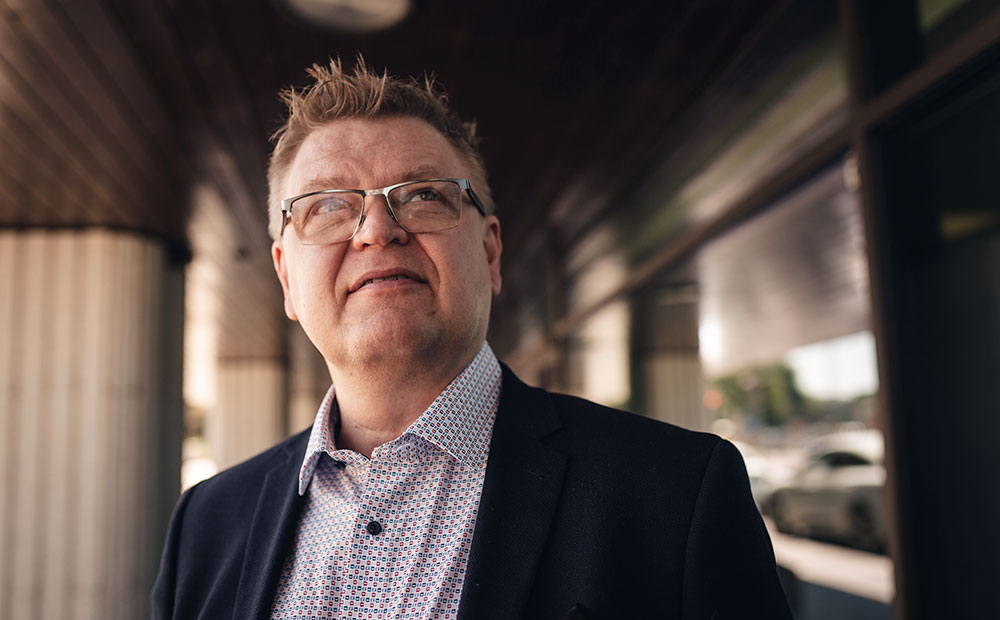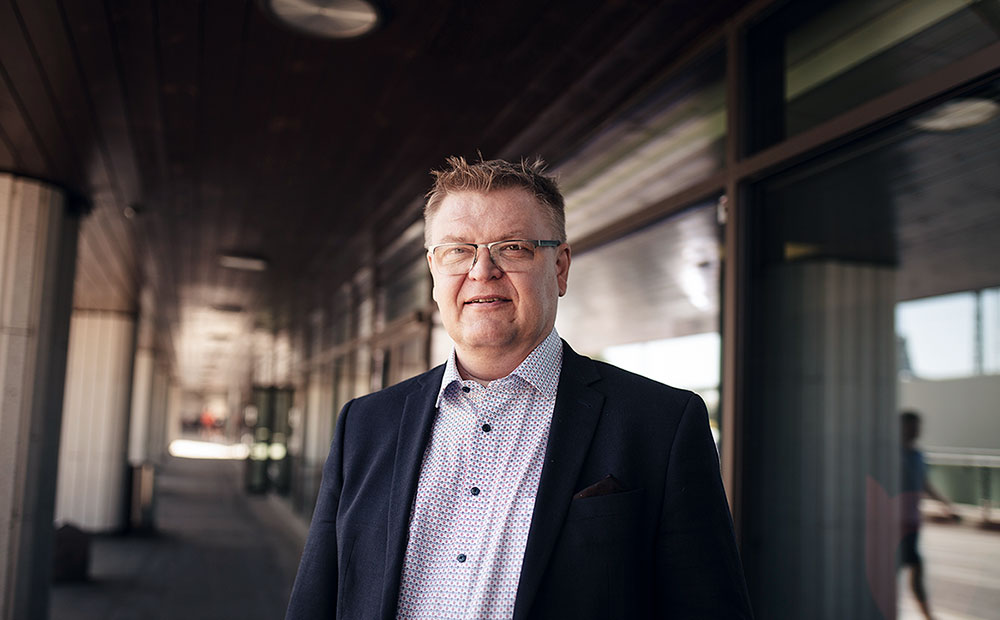Producers’ interests at the forefront as Mika Surakka, CEO of Finnish Plastics Recycling Ltd, develops a new multi-material producer organisation

“I wish the work community could become like the best sports team I’ve ever been on,” says Mika Surakka, who has worked in American football. And that’s exactly what the CEO of Finnish Plastics Recycling has been aiming for when building the new producer organisation in the midst of so many changes – the focus is on the team rather than on the individuals.
Surakka, who has had a long career in circular economy and producer responsibility, has been the CEO of FPR for two years, since June 2021. He worked in waste recycling at Waste Management (WM) before founding Muovix Oy, which processed recycled plastics. After years of running his own business, he moved to Poland to establish Wipak Oy’s factory. It did not take long for Surakka to start a business in Poland, too: the consulting company Erutan, which promotes foreign business activities in the country.
Development as a passion
Surakka has as a Master of Science in Engineering and has worked with packaging recycling since the start of his career in the 1990s. He has been involved in the development of packaging recycling processes and especially in recycling plastics. Muovix Oy, which Surakka founded in 2000, was the only company in Finland to use mixed plastics at the time. When plastic recycling began at WM, Surakka was involved in developing the recycling technology for PET bottles, as plastic bottles replaced those made of glass.
Surakka was working at Wipak in Finland when he was asked to supervise the company’s factory construction project in Poland as the managing director. He ended up staying in Poland for nine years, working in the packaging recycling business both for companies and as an entrepreneur.
During his time in Poland, Surakka learned the language as well as a great deal about how packaging recycling and producer responsibility work in other European countries. The producer responsibility system in Poland is different from that in Finland, “a complete mess”, according to Surakka. Working in another country also highlighted the differences in recycling practices in the two countries: not much waste comes from ready-to-eat meal packaging in Poland, while plastic water bottles are widely used. The story is very different in Finland.
Changes in the producer responsibility system motivate a move back to Finland
The new Waste Act was about to enter into force and revolutionise the Finnish producer responsibility system in summer 2021. After many years in Poland, Surakka’s return to Finland came a little unexpectedly when he was offered the position of CEO of Finnish Plastics Recycling Ltd.
The organisation was undergoing changes: the time was up for packaging material-specific producer organisations, and the packaging producer organisation had to provide services related to all packaging materials. FPR, which had only been a producer organisation for plastic packaging, had to find a new direction. Surakka was happy to accept the challenge.
“Every company in which I have been CEO has been facing some kind of changes. I consider myself a change leader,” Surakka explains his area of expertise.
In the end, two competing packaging producer organisations were formed, Finnish Plastics Recycling Ltd (Suomen Uusiomuovi Oy) and Finnish Packaging Producers Ltd (Suomen Pakkaustuottajat Oy).
The biggest savings for the producer come from plastic
Surakka thinks that FPR’s special area of expertise in plastics is a strength in the transition to a multi-material producer organisation.
“Two thirds of packaging waste fees come from plastic, and one third from other packaging materials. That means that plastic offers the best way to achieve cost savings for packaging producers,” says Surakka.
What fascinates him about plastic is the fact that it is more difficult to recycle than materials such as paper, cardboard and metal, as there are many grades of plastic and the recycling methods are relatively new. The recycling rate of plastic is the lowest of all packaging materials for this reason, and Surakka is motivated to increase the rate.
FPR is constantly developing new ways to increase the recycling rate of plastics, by means such as looking for recycling methods for plastics that are not recycled yet. Surakka wants to increase the recycling rate as cost-effectively as possible.
“I’ve always wanted to be involved in recycling business activities, not recycling activities. The ideal situation would be that we could increase the recycling rate while not increasing the costs,” he says, but admits that this is not always possible.
“Producers benefit from competition”
Surakka admits that FPR’s history as a producer organisation for plastics can make it difficult to be profiled as a multi-material producer organisation. Our organisation is, however, actively adapting to the change. FPR has invested in its employees’ knowledge about the cardboard sector, for example, and Surakka himself has experience in various packaging materials. FPR will also change its name in the coming months, which will further clarify its role.
FPR wants to invest in packaging waste management in Finland to gain a competitive edge, and has signed an agreement with Fortum to establish a new sorting plant for plastic packaging in Finland.
“Self-sufficiency is also important in circular economy, and by processing waste in Finland we can ensure that recycled raw material is available for Finnish industry,” Surakka explains.
Consequently, the benefits of recycling packaging waste will stay in Finland, and the recycled raw material will not be transported to factories in other countries. A more self-sufficient packaging waste management system is also cost-effective and beneficial in the current unstable global political situation.
Surakka thinks that the competition with Finnish Packaging Producers is a good thing:
“Many producers have praised the competition as it will reduce their costs. Development clearly slows down in a monopoly,” says Surakka.
The cooperation between Rinki and FPR will remain unchanged. Surakka says that it makes sense that Rinki provides services to both FPR and FPP. He points out that the roles must be kept clearly separate in the new situation so as not to create overlapping processes.
Years filled with work
The past year has been a hectic one for Surakka as he has steered FPR through the change in the organisation’s position. He still tries to break away from work by skiing and off-road racing, for example. Sports that require full concentration help him forget about work matters.
“Those who are active in their free time tend also to be active at work,” Surakka says of his eventful career.
Who: Mika Surakka
Education: M.Sc. in engineering
Career: Worked in waste recycling at Waste Management (WM) in the 1990s. Founded Muovix Oy, a company that processes recycled plastic, in 2000. Worked at Wipak Oy in Finland and Poland in packaging recycling in the 2010s. Founded Erutan, a consulting company that promotes business activities in Poland. CEO of Finnish Plastics Recycling Ltd since June 2021.
Hobbies: Enduro, downhill skiing, skiing, spending time at his summer cottage, poker.
Finnish Plastics Recycling Ltd
FPR is a packaging producer organisation that is responsible for the implementation of its customers’ producer responsibility obligations. The Pirkanmaa ELY Centre accepted FPR into the producer register on 5 May 2023, when FPR, known as a producer organisation for plastic packaging, also took over responsibility for cardboard, glass and metal packaging.
